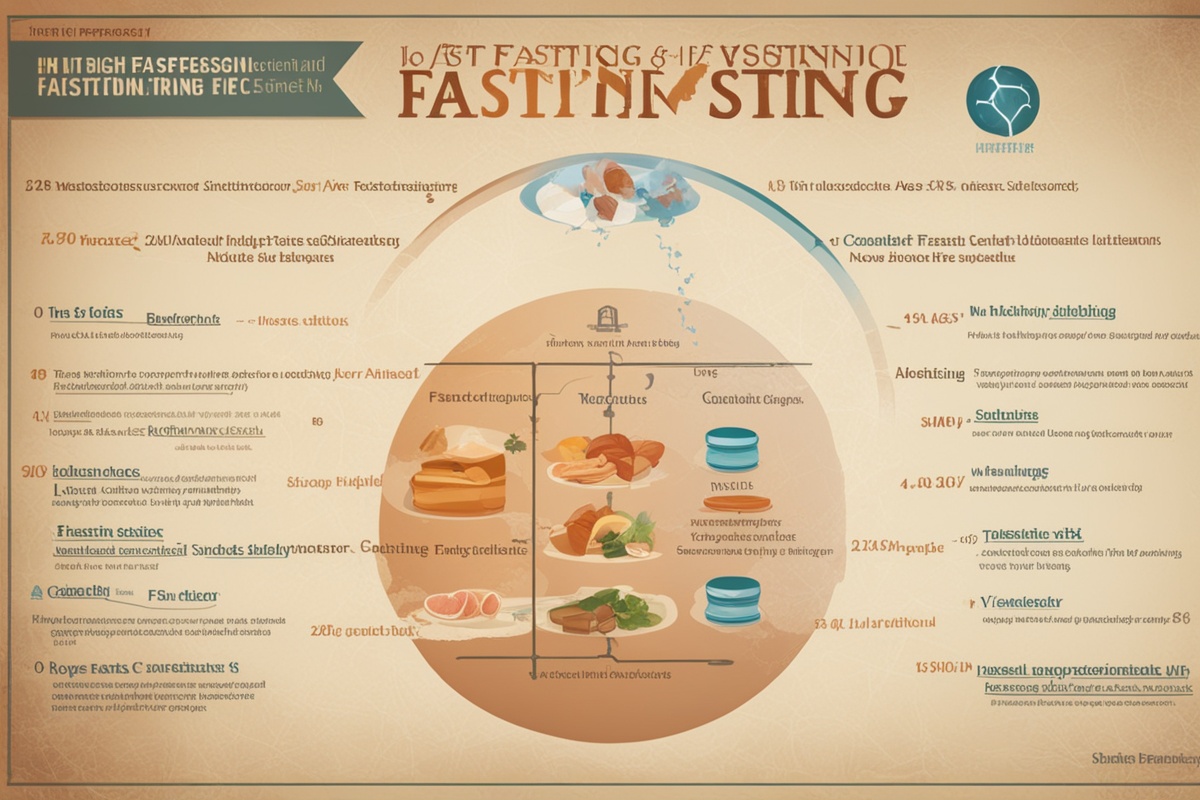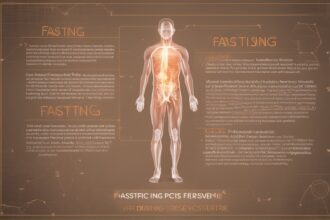Hey there, health enthusiasts! If you’ve ever wondered whether fasting is just a trend or a scientifically backed approach to better health, you’re in the right place. Today, we’re diving deep into scientific fasting studies to uncover what researchers have discovered about this ancient practice. Fasting, in its many forms—intermittent fasting, water fasting, or time-restricted eating—has gained massive popularity for weight loss, improved metabolism, and even longevity. But what does the science say? Let’s explore the evidence behind fasting, break down key findings, and share actionable tips to help you decide if it’s right for you. Stick with me as we unpack the facts with a mix of hard data and practical advice!
The Rise of Fasting: Why Science Is Paying Attention
fasting isn’t new—it’s been part of cultural and religious practices for centuries. However, in recent decades, scientific fasting studies have brought it into the spotlight as a potential tool for health optimization. Researchers are intrigued by how abstaining from food for specific periods can trigger unique physiological responses in the body. From cellular repair to improved insulin sensitivity, the mechanisms behind fasting are being studied in labs worldwide. A landmark study by Longo and Mattson (2014) highlighted how fasting could mimic the effects of calorie restriction, potentially extending lifespan in animal models (Longo & Mattson, 2014). This growing body of research has shifted fasting from a spiritual ritual to a subject of rigorous clinical investigation. So, what exactly are scientists uncovering? Let’s break it down.
Key Findings from Scientific Fasting Studies on Health Benefits
The health benefits of fasting are where the research gets exciting. Numerous fasting research studies have pointed to a range of positive outcomes when done correctly. One of the most well-documented benefits is improved metabolic health. Intermittent fasting, for instance, has been shown to enhance insulin sensitivity and reduce blood sugar levels, which could lower the risk of type 2 diabetes (Patterson & Sears, 2017). Additionally, fasting triggers a process called autophagy, where cells clean out damaged components—a mechanism linked to aging and disease prevention (Bagherniya et al., 2018). But that’s not all. Here are some standout benefits backed by science:
- Weight Loss and Fat Reduction:
- Cardiovascular Health: Research suggests fasting may lower blood pressure, cholesterol, and triglycerides, supporting heart health (Horne et al., 2015).
- Brain Function: Some animal studies indicate fasting boosts brain-derived neurotrophic factor (BDNF), which supports cognitive health and may protect against neurodegenerative diseases (Mattson et al., 2017).
- Inflammation Reduction: Fasting has been linked to decreased markers of inflammation, a key driver of chronic diseases (Farooq et al., 2020).
While these findings are promising, it’s worth noting that most studies are short-term or conducted on small groups. Long-term human trials are still needed to confirm these effects. Still, the early data from fasting health studies paints an encouraging picture.
Potential Risks and Limitations in Fasting Research
Before you jump on the fasting bandwagon, let’s talk about the flip side. Not all scientific fasting studies paint a rosy picture, and there are risks to consider. For one, fasting isn’t suitable for everyone. People with certain medical conditions, like diabetes or eating disorders, should avoid it unless under medical supervision. Studies have also pointed out potential side effects like fatigue, irritability, and nutrient deficiencies if fasting isn’t paired with a balanced diet (Patterson & Sears, 2017). Moreover, some research suggests that prolonged fasting might slow metabolism over time, though evidence is mixed. The biggest limitation in fasting science research is the lack of large-scale, long-term studies on diverse populations. Most data comes from short trials or animal models, so we can’t yet make universal claims about safety or efficacy. Always consult a healthcare provider before starting any fasting regimen to ensure it aligns with your health needs.
Different Types of Fasting: What Studies Focus On
Not all fasting is created equal, and scientific fasting studies often examine specific protocols to understand their unique impacts. Whether you’re curious about intermittent fasting or extended fasts, here’s a quick rundown of the most researched types and what science says about them:
- Intermittent Fasting (IF): This includes methods like the 16/8 (fast for 16 hours, eat during an 8-hour window) or 5:2 (eat normally for 5 days, restrict calories for 2). Studies show IF can aid weight loss and improve metabolic markers (Tinsley & La Bounty, 2015).
- Time-Restricted Eating (TRE): A subset of IF, TRE limits eating to specific hours each day. Research suggests it aligns with circadian rhythms, potentially enhancing metabolic health (Horne et al., 2015).
- Water Fasting: This involves consuming only water for a set period. While some studies note benefits like rapid weight loss, risks like dehydration and electrolyte imbalance are significant without supervision.
- Prolonged Fasting: Lasting over 48 hours, this is often studied for autophagy and cellular repair. However, human data is limited, and risks increase with duration (Longo & Mattson, 2014).
Each method has its own set of pros and cons, and research is still evolving. If you’re new to fasting, starting with a gentler approach like time-restricted eating might be the safest bet while you gauge how your body responds.
Practical Tips for Fasting Based on Research Insights
Now that we’ve covered the science, let’s get practical. How can you apply findings from scientific fasting studies to your life in a safe, sustainable way? I’ve been experimenting with fasting for a few years now, and combining personal experience with research has helped me fine-tune my approach. First, start slow—don’t dive into a 72-hour water fast if you’ve never skipped a meal. Begin with a 12-hour overnight fast (say, 7 PM to 7 AM) and gradually extend it. Hydration is key; studies emphasize that dehydration is a common pitfall during fasting, so sip water regularly (Farooq et al., 2020). Also, focus on nutrient-dense meals during eating windows to avoid deficiencies. Break your fast with light foods like broth or fruit to ease your digestive system back into action. And listen to your body—if you feel dizzy or unwell, stop and reassess. Fasting should feel challenging but not punishing. Lastly, track your progress with a journal to note energy levels, mood, and any changes in weight or health markers. Pairing these habits with insights from fasting clinical research can help you maximize benefits while minimizing risks.
The Future of Fasting Research: What’s Next?
The field of scientific fasting studies is still young, and there’s so much more to learn. Current research is heavily focused on intermittent fasting and metabolic health, but future studies may dive deeper into fasting’s impact on mental health, cancer prevention, and aging. Scientists are also exploring personalized fasting protocols—could your genetics or lifestyle determine the best fasting method for you? Clinical trials are underway to test fasting as an adjunct therapy for conditions like obesity and autoimmune diseases (Bagherniya et al., 2018). As technology advances, wearable devices might even help monitor fasting’s real-time effects on biomarkers like glucose and ketones. For now, staying updated on fasting health studies is the best way to make informed decisions. I’m excited to see where this research leads, and I hope you are too!
Wrapping up, it’s clear that scientific fasting studies offer a fascinating glimpse into how a simple act—abstaining from food—can profoundly impact our health. From boosting metabolism to potentially slowing aging, the benefits are compelling, though not without caveats. Fasting isn’t a one-size-fits-all solution, and the science is still evolving. But with the right approach, informed by fasting research studies, it can be a powerful tool in your wellness toolkit. Remember to start small, prioritize safety, and consult a professional if you’re unsure. Have you tried fasting, or are you curious to start? Drop a comment—I’d love to hear your thoughts and experiences! Let’s keep learning together as new research unfolds.
References
- Bagherniya, M., Butler, A. E., Barreto, G. E., & Sahebkar, A. (2018). The effect of fasting or calorie restriction on autophagy induction: A review of the literature. Ageing Research Reviews, 47, 183-197.
- Farooq, M. A., Nimbalkar, V. P., & Rajput, S. S. (2020). Intermittent fasting and inflammation: A narrative review. Journal of Nutrition & Food Sciences, 10(3), 1-5.
- Horne, B. D., Muhlestein, J. B., & Anderson, J. L. (2015). Health effects of intermittent fasting: Hormesis or harm? A systematic review. The American Journal of Clinical Nutrition, 102(2), 464-470.
- Longo, V. D., & Mattson, M. P. (2014). Fasting: Molecular mechanisms and clinical applications. Cell Metabolism, 19(2), 181-192.
- Mattson, M. P., Longo, V. D., & Harvie, M. (2017). Impact of intermittent fasting on health and disease processes. Ageing Research Reviews, 39, 46-58.
- Patterson, R. E., & Sears, D. D. (2017). Metabolic effects of intermittent fasting. Annual Review of Nutrition, 37, 371-393.
- Tinsley, G. M., & La Bounty, P. M. (2015). Effects of intermittent fasting on body composition and clinical health markers in humans. Nutrition Reviews, 73(10), 661-674.






